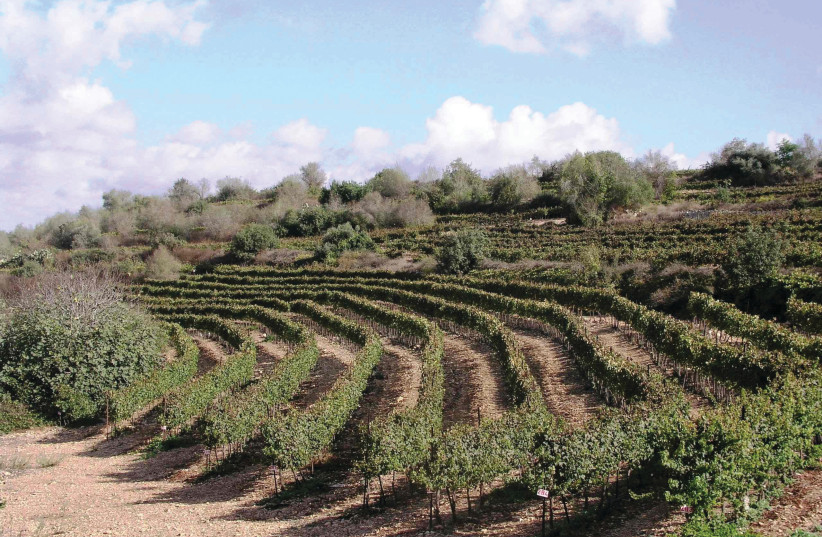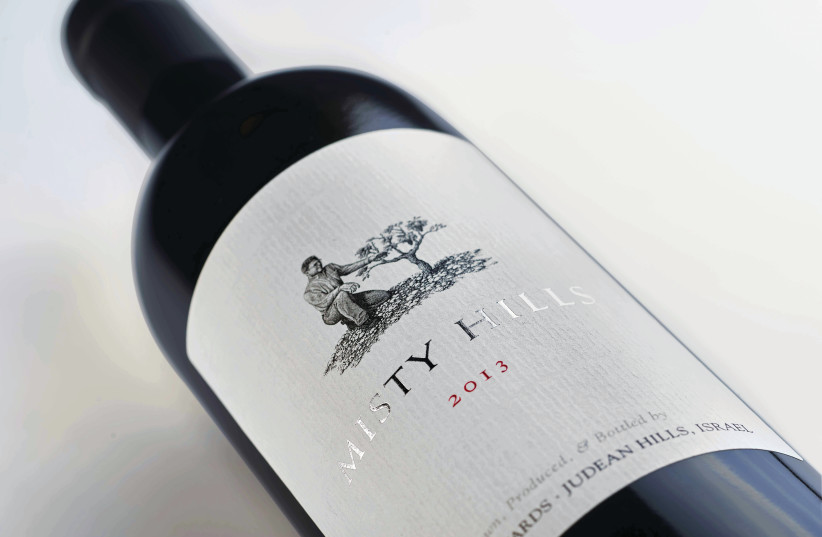In these black days of mourning, concern for the missing, and the war, it is important to remember the agriculturists, wine growers, and winemakers. The life cycle of the vine and wine does not stop for anyone or anything.
No one is in the mood to drink wine. Sales, particularly in restaurants, have dropped considerably. This particularly affects smaller wineries. One of our most distinguished small wineries is Tzora Vineyards, which this year is celebrating its 30th anniversary. Let’s consider its story and its contribution to Israeli wine.
Tzora Vineyards in the 1990s was a leader in the boutique winery boom. Here we are in the 2020s, and it is regarded as one of Israel’s very finest small wineries. As wine is a product of people and place, the winery may be described in another way: 15 years of Ronnie James and 15 years of Eran Pick MW (Master of Wine).
James was a kibbutznik who managed Tzora’s vineyards for the Carmel wine cooperative. He was infatuated with growing vines and certain that he could only fulfill his role as a grower if he made wine from his precious grapes. Thus, with great determination and after a fair amount of persuasion, he succeeded in founding Tzora Vineyards in 1993. He was the second grower after Yonatan Tishbi to found a winery. Another rookie winemaker, Eli Ben-Zaken of Castel fame, filmed that first harvest, which is amazing footage to view 30 years on.
James was folksy, authentic, unspoiled, and lovable. He was a salt of the earth character; a man of the soil, who became a pioneer. He instinctively believed that his wine should represent a place, and his passion was inspiring.

We kept our eyes on him and listened to what he had to say. He was totally self-taught. He learned as he went along, by trial and error. Much of his success was because of a finely honed gut instinct. He had an unadulterated love for the vine and wanted to fulfill its potential by making quality wine. It was as simple as that.
My favorite wines of his were Givat Halukim (Stone Hill), a chewy red; and a bright Sauvignon Blanc that was still amazingly youthful 10 years later. However, Tzora wines were domestic treats. They were not heard of abroad.
That was until the Ilan Misty Hills 1999 scored 17.5 points on jancisrobinson.com. This is the website of Jancis Robinson MW, today’s leading wine critic and wine writer. The Misty Hills was the equal highest-scoring Israeli wine in the tasting. This was an impressive forum to make an international announcement that Tzora was making pretty good wines.
Unfortunately, James passed away well before his time in 2008, after a cruel illness, but not before he had made some pretty crucial decisions. In 2006, he recruited a young winemaker named Eran Pick to work at the winery. He found an investor and by so doing, introduced Nathan Hevrony to the winery. He also closed a distribution agreement with Shaked for the Israeli market. Each of these decisions stood the test of time and bore fruit in ways that possibly even James could not have imagined.
Pick is the polar opposite of James. They come from different ends of the spectrum. Pick is studious, academic, experienced, worldly, and totally up to date. He graduated in viticulture and enology from UC Davis with highest honors. He had valuable experience in California (Napa and Sonoma), in Australia (Barossa), and in France (Bordeaux).
He comes from almost a completely opposite background to James’s. But their views converged and overlapped in the most important place – smack in the middle of the vineyard.
They both shared the same absolute, unshakable belief that to be authentic, wine must have a sense of place. Therefore, it has to be an expression of the vineyard and the local terroir. In James’s era, this idea was way before its time. In Pick’s era, it has become more commonplace.
IF YOU visit a winery, nearly everyone will choose to host you in the visitors’ center. If you are privileged to be hosted by Pick, he will invariably choose to meet you in the Shoresh Vineyard. For him, this is the place where the wine is grown and nurtured. To understand the essence of the winery, you have to be in the vineyard.
I once asked him, “Did you ever consider buying fruit from the Galilee or Golan to supplement what you have?” He may have looked at me with disdain, except that is not his way; he gives respect to everyone, but his answer was brief and unequivocal. “What would be the point?” he answered. It was not even an option.
Now the high elevation of the Shoresh vineyard, on the hills that rise toward Jerusalem, has joined El Rom (and Kayoumi that was) as one of Israel’s most famous vineyards. It is a patchwork of different plots, with different aspects, and it allows the winery to produce its five wines made from grape varieties, which are each grown in optimum conditions.
Pick became the rock star of Israeli wine when he became our first Master of Wine. Of course, the description does not match his quiet character.
I can’t overstate the effect this incredible achievement had on the image of Israeli wine. No doubt his new status has helped our image and enabled the story of Israeli wine to reach farther and wider than ever before.

Forming the Judean Hills Quartet wine consortium
TZORA VINEYARDS also played a leading role in the formation of the Judean Hills Quartet, a consortium formed to advance the Judean Hills as a quality wine region. The tastings and meetings they have held internationally have been extremely beneficial not only to the Judean Hills, and of course to the wineries themselves, but also to Israeli wine as a whole.
The model of cooperation and the idea of marketing “Brand Israel” together is something I tried to create 20 years ago with the founding of Handcrafted Wines of Israel. James and Tzora Vineyards were early supporters of that initiative, too. Anyway, the lesson and example set for other wine regions to emulate and follow are proven and clear. Let’s hope others pick up the baton.
Fast forward to 2023. Tzora Vineyards is ranked as Israel’s leading winery in Hugh Johnson’s Pocket Wine Book, being awarded the maximum four stars, alongside Domaine du Castel. This is the nearest there is to a Michelin Guide for wine. Furthermore, Tzora Vineyards has been awarded the highest scores ever received for an Israeli wine in the world’s two most famous wine magazines – Wine Spectator (US) and Decanter (UK.)
If James were looking down, as I hope he is, he would be extremely proud that his baby has developed the way it has. The credit goes to the very modest, soft-spoken, very supportive owner, Nathan Hevrony. He is the owner that any winery would dream of.
Pick joined as a young man out of wine school but has taken Tzora forward in leaps and bounds. He is also a great advocate for Israeli wine worldwide. Maybe the Tzora Or 2006 dessert wine was a first glimpse of what he was capable of. It scored 92 points on robertparker.com – then a very high score for an Israeli wine. The winery has since gone from strength to strength.
Pick, who acts as both winemaker and CEO, is supported by three other important people. Dan Sheinman is the assistant or associate winemaker. He is a vineyard specialist with experience in Burgundy and is also a bit of a poet. “Winemaking represents an interaction between inspirations and aspirations,” he says. I like that. I think it is a quote I will be repeating.
Dor James looks after the vineyard. He is Ronnie James’s son, and it is beautifully symbolic that he is involved, and he is a very important cog in the wheel.
Finally, Tzora’s wine consultant is one of the great names of wine, Jean Claude Berrouet. For more than 40 years, he was the technical director of Chateau Petrus. You can’t get better than that!
TZORA VINEYARDS symbolize some important new paths. For a starter, they produce some of the finest white wines in Israel. For me, more than any other winery, they represent the white wine revolution of the last 10 years. Their whites are outstanding, and I am especially proud that as a country we can make whites of this quality.
Secondly, the winery represents the identity revolution in Israel. The wines are blends, and they come from a single vineyard. The day will come when people talk about Israeli wines in terms of a wine region, vineyard, or individual block or plot rather than by varietals, which is really how many wines have been identified up to now.
Tzora is a symbol of this new search for identity and is leading the way. Their wines are named in the classic quality pyramid of region, vineyard, and plot. Hence, you have their wines respectively named Judean Hills, Shoresh, and Misty Hills, which is named for what is known as the fossil block. The focus is totally on the place. The name Tzora is so low-key, you will barely see it unless you have a good pair of glasses.
My favorite Tzora Vineyards wine is the Judean Hills Red, which is for me one of the best value wines in Israel. It is beautifully balanced and, what’s more, refreshingly drinkable. This is a quality not always apparent in some of our best wines.
The Shoresh Blanc is wonderfully flinty and minerally, characteristics lacking in most Israeli whites. It is a blend of Sauvignon Blanc and Chardonnay. Finally, the prestige Misty Hills (Cabernet Sauvignon – Syrah) is so elegant… but don’t listen to me.
Jancis Robinson recently tasted wines made by winemakers who were fellow Masters of Wine. There are only about 100 MW winemakers in the world. After tasting the two wines shown by each winemaker, she named the eight winemakers who impressed her the most with both their wines. One of the eight was our own Pick of Tzora Vineyards!
She described the Misty Hills 2020 with terms like “fresh” and “lively,” and then wrote: “No one would guess this is a stereotypically bumptious Israeli wine.” I loved that!
So the story from Misty Hills 1999 to Misty Hills 2020 is recorded in stone on the website of no less an authority than jancisrobinson.com. Tzora Vineyards has been an important player in the last 30 years, and we will be watching the future developments closely.
This is not a winery that speaks loudly or draws attention to itself. It does not make marketing noise with unnecessary gimmicks. Everything and everyone operates on minimalistic level, except for the style and quality that shines through. Tzora Vineyards really proves the maxim that less is definitely more. This is an example of the kind of winery that Israelis should be supporting with real pride.
The writer is a winery insider turned wine writer, who has advanced Israeli wines for 35 years. He is referred to as the English voice of Israeli wine. www.adammontefiore.com
